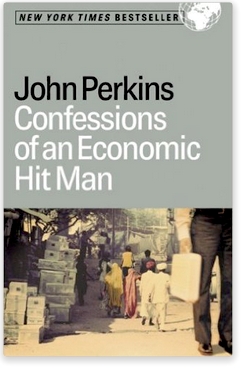 I finally got around to reading Confessions of An Economic Hit Man by John Perkins. I highly recommend this book to anyone who cares about America and is concerned with the recent proliferation of events and crises which appear to be sabotaging much of what most of us hold dear about our country. I especially recommend it to people out there who have naively bought into the satisfying but quite simplistic notion that everything our country does is wonderful and altruistic, that our primary mission in the world is and has been to spread democracy, promote justice and human rights, fight for freedom and equality, that the U.S. just wants peace and only resorts to violence and military conflict as a last resort.
I finally got around to reading Confessions of An Economic Hit Man by John Perkins. I highly recommend this book to anyone who cares about America and is concerned with the recent proliferation of events and crises which appear to be sabotaging much of what most of us hold dear about our country. I especially recommend it to people out there who have naively bought into the satisfying but quite simplistic notion that everything our country does is wonderful and altruistic, that our primary mission in the world is and has been to spread democracy, promote justice and human rights, fight for freedom and equality, that the U.S. just wants peace and only resorts to violence and military conflict as a last resort.
I do this, not to shock anyone, or pursue some malicious agenda.
I do this because humankind appears to be rushing headlong down a suicidal path which can only result in the extinction of our species, yet somehow we face our self-annihilation not with alarm and trepidation, but embrace and celebrate most of what is taking us there, with glee and joyful abandon. Actually, much of what the book talks about has been going on, unbeknownst to most of us (including myself), for a long time. And I believe the only way to turn things around and begin constructive and cooperative engagement with the rest of the world community __ if it’s not too late __ is to fully understand what the worst of these activities consists of, to openly confront what has been done in our names as U.S. citizens, and analyze what prompts such sinister pursuits, towards demanding this ugly business immediately stop.
Much of what I discovered in Confessions aligned with my already deeply held suspicions about the “purity” of our values and intentions, and my intuitive sense of the hollowness of the self-congratulatory rhetoric we disseminate as to our exceptional role in history as the nation chosen by destiny to lead.
But going far beyond those superficial impressions, Perkins’ highly readable exposition provided a thorough and clear narrative which explains, among other things, what often appear to be dubious, self-sabotaging decisions by our political leaders, decisions which seem to be at odds with the broader interests of the country. It also goes a long way toward explaining why America’s favored approach is quickly making us the most hated empire in modern times.
Our methodology is easy to grasp. America sends out some of its finest economic advisers to developing countries in the world to recommend taking on huge loans for infrastructure development. These are provided mostly through the IMF and World Bank. Our advisers are referred to as EHMs, as in ‘economic hit men’, and their job is to use all sorts of highly sophisticated models, dense and incomprehensible statistics and other persuasive devices, to conjure overly-optimistic forecasts for all of the wonderful benefits of taking on highly inflated bank loans. These loans are never intended to be paid back. They are by design so onerous they guarantee default, at which time the banks go into the country and take over national assets, plunder the natural resources __ oil, gas, diamonds, precious metals __ and privatize the public services. Essentially, the banks “repo” the country. By the way, we have been watching this exact scenario unfold in Greece over the past couple years. Tragically, Ukraine has also bought into this shell game.
This is what imperialism looks like in the 21st Century. America is conquering the world, one country at a time, using its own wealth and powerful economic institutions to gobble up naive and unsuspecting victim countries, impoverishing their populations, enriching their oligarchic class (who get a nice cut of the initial loans but force their own citizens to pay the loan balance), stripping the wealth that could have been used to raise the countries out of poverty, and lastly gaining a permanent foothold for our military bases and further corporate exploitation.
The real kicker is that the money for these loans never arrives in the countries themselves. These deals are arranged so that the public works projects __ dams, hydroelectric plants, communication systems, and other infrastructure __ are all performed by giant American corporations like Halliburton and Bechtel. The loans go from the banks into the coffers of these behemoths, with virtually none of it trickling down to help the local populations.
So we loan the country money they can never repay, the money goes to U.S. corporations, the country defaults, we go in and plunder the nation’s resources, our already incredibly wealthy .01% who own the corporations get even richer, America ends up with another vassal state, and the people of the country sink even deeper in misery.
This is what passes for the noble work of the U.S. across our globe.
I would love to say that I admire Mr. Perkins for his “confession”. I certainly appreciate the insider view he has given into the vicious enterprise which he himself participated in and benefited from over most of his life. He claims that he had moral issues with what he was doing over the entire course of his career. That he waited over thirty years, during which time he accumulated a sizable fortune and lived the privileged life of a high-level corporate executive, before he finally made the break from his notorious, highly destructive career as an EHM, casts a long shadow of doubt as to his honor and how much praise he deserves for his late-adopted penitent role as whistle blower.
We all make difficult choices in life, putting career before art, sometimes job before family or community service. But for most of us, the little compromises and rationalizations don’t result in the destruction of whole countries, uprooting of hundreds of thousands of people, genocide of indigenous tribes, ruination of rain forests, the poisoning and devastation of entire ecosystems, wholesale plundering of economies, the enslavement of millions of innocent individuals, or accelerating the crippling wealth inequality across the planet.
Mr. Perkins should be commended for telling his story and giving invaluable insights into the behind-the-scenes workings of U.S. foreign policy, but he certainly should not be given a pass for the decades he gave in service to such horrifying plunder, especially considering his dedication and effectiveness as a corporate sellout of the worst kind ultimately made possible this book, which will net him even more income, yet another reward for his villainous role as an economic hit man.



